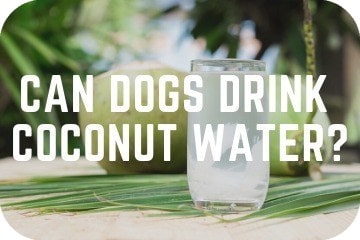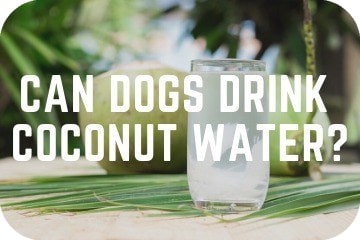
Can dogs drink coconut water? Yes, coconut water is safe for dogs to drink as an occasional treat. It does not replace regular water. Coconut water can be used as a healthy and hydrating drink or used in dog treats. It is rich in carbohydrates, potassium, calcium, and electrolytes. Make sure to use 100% pure coconut water, without any added sugars or sweeteners.
How much coconut water can my dog drink?
It depends on the size, weight, breed, and activity level of your dog.
Coconut water should be used as a treat. Treats should only make up a maximum of 10% of your dogs’ daily intake.
When you introduce coconut water, start by giving your dog a little and see if it agrees with them before increasing their intake.
Dogs do not need coconut water in their diet. There regular dog food should contain all of their required vitamins and nutrients. So, do not give them unlimited access; a small quantity is enough as a treat.
Coconut water can cause stomach upset and cause your dogs’ potassium levels to rise, causing side effects.
What is coconut water?
Coconut water is the naturally occurring juice of green, young coconuts. It is a clear liquid with a slight haze with the consistency of regular water.
It is not to be confused with coconut milk. Coconut milk is processed from mature coconuts by grinding the flesh. It is creamy in consistency and white in color.
Coconut water is considerably lower in calories and fat compared to coconut milk.
Busy? Get Your Hands Paws On The Answers Quickly…
- Nutritional Information Of Coconut Water
- Benefits Of Coconut Water For Dogs
- Risks Of Coconut Water For Dogs
- How To Feed Your Dog Coconut Water
- Can Dogs Eat Other Coconut Products?
- FAQs
NUTRITIONAL INFORMATION OF COCONUT WATER
Amount per 1 cup (240g)
| Calories | 45 |
| Total Fat | 0.5 g |
| Sodium | 252 mg |
| Potassium | 600 mg |
| Total Carbs | 9 g |
| Dietary Fiber | 2.6 g |
| Sugar | 6 g |
| Protein | 1.7 g |
BENEFITS OF COCONUT WATER FOR DOGS
Source of Nutrients
Coconut water is a good source of fiber, carbohydrates, and potassium. These are good for digestion, energy, and general health and immunity.
Refreshing and Hydrating
Coconut water is around 94% water. It thought to help with dehydration. This is because not only does it have a high water content, but it is higher in calories than water and contains electrolytes.
Antioxidant Effects
Coconut water contains antioxidants. Antioxidants protect healthy cells from free radicals. Too many free radicals can cause health risks.
A study on rats showed that those fed coconut water had decreased free radical activity (link).
Improves Health
Coconut water has been linked to helping support heart health, kidney function, and aid diabetes (link) (link) (link).
RISKS OF COCONUT WATER FOR DOGS
Added ingredients
Only feed your dog 100% pure, natural coconut water. Make sure to check the ingredients list. Some varieties contain sweeteners and added sugar to enhance the flavor.
These are not recommended for dogs. Sugar can cause weight gain, behavioral changes, and dental issues. The sweetener xylitol can be deadly to dogs.
Stomach Upset
Coconut water can cause gastric upset, including vomiting and diarrhea. This may be due to the sodium, or if it is their first time trying it.
If you are introducing coconut water for the first time, start by giving your dog a little bit and see how it affects them. If your dog enjoys it and their stomach tolerates it, you can increase the amount.
Make sure coconut water is only fed as a treat.
Weight Gain
Coconut water is easy to drink; it’s also easy to forget; it’s not just regular water. At 45 calories a cup, it doesn’t take a lot, especially for a smaller dog, to consume far more than the recommended calories. Make sure only to give your dog coconut water as an occasional treat.
High In Potassium
Coconut water contains 600mg of potassium per cup. A dog of 30lb is thought to need around 1g of potassium per day, according to NAP. Potassium is crucial for normal functioning in dogs. However, too much or too little can be dangerous, resulting in kidney issues.
If your dog has high potassium levels and consumes a considerable amount of coconut water, they may develop hyperkalemia. This occurs when the potassium levels in the blood are too high. Symptoms include gastrointestinal upset, less urinating, lethargy, collapse (link) (link).
HOW TO FEED YOUR DOG COCONUT WATER
Coconut water can be given to your dog without adding anything as a refreshing drink, or you can top their kibble with a splash.
Coconut water can also be baked into treats or frozen into an icy snack on a warm day.
OUR FAVORITE COCONUT WATER RECIPES:
Watermelon and Coconut Frozen Treats, inspired by Gone To The Snow Dogs
Ingredients:
- 2 cups watermelon, chopped and seeds removed
- 1 cup coconut water
- 1/4 cup honey
Directions:
1. Add all of the ingredients to a blender.
2. Blend until the mixture resembles a juice.
3. Pour the mixture into an ice cube tray.
4. Freeze for 4+ hours.
5. Enjoy!
Coconut and Apple Ice Treats, inspired by Leela Ryan
Ingredients:
- Coconut water
- Apple (or any other dog-safe fruit or vegetable)
Directions:
1. Chop the apple into small chunks.
2. Place the chunks into an ice cube tray.
3. Top the ice cube tray with coconut water.
4. Freeze for 4+ hours.
5. Enjoy!
Coconut and Honey Dog Biscuits, inspired by Manuka Honey USA
Ingredients:
- 3 cups brown rice flour + extra for rolling
- 1 cup coconut water
- 1 cup coconut flour
- 2 eggs, large
- 2 tbsp manuka honey
- 2 tbsp coconut oil
Directions:
1. Preheat the oven to 350 degrees F (176 degrees C). Line a baking sheet with parchment paper.
2. Mix the rice flour and coconut and make a well.
3. Add the remaining ingredients into the well and mix.
4. Knead the dough to form a ball.
5. Flour a clean work surface and roll the dough to 1/4-inch thick.
6. Cut into your desired treat size and place them on the baking sheet.
7. Bake for 18-22 minutes, or until golden and crisp.
8. Allow to cool before serving.
CAN DOGS EAT OTHER COCONUT PRODUCTS?
Coconut Meat – Safe for dogs.
Coconut meat is healthy for dogs. It can help to boost the immune system, as well as improve skin texture.
Coconut Shell – Not recommended for dogs.
The shell of the coconut is not recommended for dogs as it is hard, and particles can break off. This can cause choking and break teeth.
Coconut Oil – Safe for dogs.
Coconut oil is excellent for improving your dogs’ coat and skin, improving gut health, and potentially helping with weight loss. However, it is high in fat, so it should be fed sparingly. The high level of fat can also cause gastric upset.
Coconut Milk – Ok for dogs.
Coconut milk is processed, and therefore it can contain additives that are not necessarily beneficial for dogs. However, it is considered non-toxic. It might have some health benefits, including improving immunity and skin and coat.
FAQS
What can dogs drink besides water?
We don’t recommend anything other than water. However, it is safe for dogs to consume a little pure fruit juice (except grape), milk (if they are not sensitive to dairy), and coconut water. Many companies also sell drinks designed specifically for dogs, such as pawsecco, and other pet-friendly alcohol alternatives.
Can dogs eat whole coconuts?
Not really, coconut is not toxic, and the meat and water are safe for dogs. However, the shell can cause choking or an intestinal blockage.
Can dogs drink tea?
Not really, a small amount should be ok for dogs. But it is not recommended to give your dog anything caffeinated. Sugar and milk are also commonly added. Again these aren’t great for dogs. It is best to stick to water. Check out our article ‘Can Dogs Drink Tea’ for more information (link).
Is coconut meat good for dogs?
Yes. Coconut meat is safe for dogs and can improve the condition of your dogs’ coat and strengthen immunity. It is high in calories and fat, so make sure to feed it within your dogs’ daily allowance.
Looking for more pawsome posts? Check these out…
Can Dogs Eat Lettuce?
How To Make A Snuffle Mat
When Do Puppies Lose Their Teeth?
Can Dogs Eat Broccoli?
Can Dogs Eat Watermelon?
Disclaimer: Each dog is different, and every circumstance is different. All efforts have been made to provide accurate information. However, it is not provided by a qualified Veterinarian, Veterinarian Surgeon, or Behaviorist. The information provided is purely educational. The information should not be used as an alternative or substitute for medical care. If you have any health or medical concerns, contact a qualified Veterinary Surgeon or Veterinarian immediately.










No Comment! Be the first one.